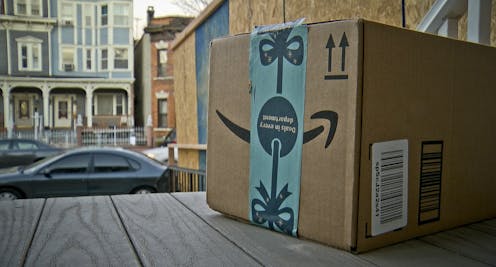Porch piracy: Here's what we learned after watching hours of YouTube videos showing packages being pilfered from homes
- Written by Ben Stickle, Associate Professor of Criminal Justice, Middle Tennessee State University

Deliveries of groceries and packages are soaring[1] as physical retailers close their doors and tens of millions of Americans “shelter in place.” Moreover, the need for social distancing may encourage more delivery workers to leave packages unattended on porches rather than risk an interaction with someone who has the coronavirus.
These conditions may be perfect for thieves, who prior to the pandemic were increasingly pilfering[2] packages from homes across the country.
About 11 million homeowners reported having a package stolen[3] in 2017 – and a separate 2018 survey found[4] that almost a fifth of Americans said they had been a victim. Three-quarters of the 2017 thefts occurred during the day, and the average cost of the stolen items was close to US$200.
I led[5] a recent study[6] of “porch piracy” to better understand how it happens. I enlisted the help of two graduate students, Melody Hicks[7] and Zachary Hutchinson, to help me review the videos, and my wife Amy Stickle[8], a math lecturer, performed a statistical analysis to ensure accuracy of the data collected.
We examined 67 home security videos uploaded to YouTube to observe the behavior of porch pirates before, during and after they stole a package. Our analysis, which documented 98 stolen packages, reveals some interesting trends and possible prevention techniques.
We found that thefts typically transpired close to roadways, with packages being visible from the street in nearly all incidents of theft. Most packages that were stolen were of medium size and had brand names on the boxes.
Very few thieves attempted to disguise themselves. As they approached residences, neither fences, cameras or vehicles parked in the driveway seemed to deter them. And a few thieves appeared to be actually following delivery vehicles.
We noticed that to avoid suspicion when executing their heists, some thieves carried “dummy items” with them to reduce suspicion, such as paperwork, packages or other items to make their visit seem legitimate.
In virtually every incident, a single individual approached the home and took the packages. In a third of cases, there was also an accomplice involved who usually served as a getaway driver.
One aspect that particularly struck us was how quickly the thefts transpired. From start to finish, we documented several that took under 30 seconds to complete.
In terms of solutions, recipients would be smart to try to ensure there’s a secure container or location to store packages until they can be retrieved. Businesses should make sure to always notify customers when packages are delivered and avoid leaving them in the open.
Put simply, our research suggests vigilance is key. And as more stuff arrives at our doorsteps, it’ll be easy pickings for thieves unless retailers, delivery companies, law enforcement and consumers don’t do more to curb porch piracy.
[Expertise in your inbox. Sign up for The Conversation’s newsletter and get a digest of academic takes on today’s news, every day.[9]]
References
- ^ are soaring (blog.aboutamazon.com)
- ^ were increasingly pilfering (www.marketplace.org)
- ^ reported having a package stolen (www.businesswire.com)
- ^ 2018 survey found (blog.canary.is)
- ^ I led (www.researchgate.net)
- ^ recent study (doi.org)
- ^ Melody Hicks (www.researchgate.net)
- ^ Amy Stickle (www.researchgate.net)
- ^ Expertise in your inbox. Sign up for The Conversation’s newsletter and get a digest of academic takes on today’s news, every day. (theconversation.com)
Authors: Ben Stickle, Associate Professor of Criminal Justice, Middle Tennessee State University

